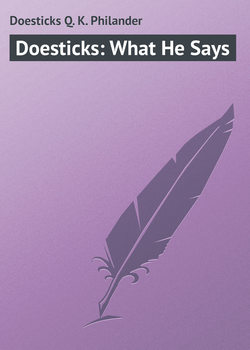Читать книгу Doesticks: What He Says - Doesticks Q. K. Philander - Страница 1
ОглавлениеNothing
In a literary point of view this book claims nothing:
This is the manufacturer's assertion.
In a literary point of view this book amounts to nothing.
This will be the reader's conclusion.
And if any skeptical person insists upon investigating the matter for himself, he will eventually be compelled to acknowledge the verity of this remark; and will, at the same time, bear a strong testimony to the sagacity of the publisher, who has put his trust in nothing —for he will have bought the book.
This work simply professes to be sketches of various persons, places, and events – some of which have been published, and some hav'n't; some are bad, and some are worse; but all have a claim to originality in treatment, although the same things may have been better said by better people.
Some of these bubbles have been, for some time, floating on the sea of literature – the lightest froth of the restless wave; still there are many of them which have never met the public eye, and which are here, for the first time, set afloat.
And for their publication the writer makes no apology. Accident has brought these "airy nothings" into notice; and although many of the thoughts are not novel in themselves, but are merely whimsically put, and not a few of the whims are borrowed unhesitatingly from others, they are dressed up in a lingual garb so quaint, eccentric, fantastic, or extravagant, that each lender would be sadly puzzled to know his own.
It is undoubtedly this trick of phrase, this affectation of a new-found style, which has caused their widespread newspaper notoriety. And in the hope that people will buy the book before the trick is stale, and not suspect the secret of the joke until they read it on this page, the writer has authorized the collection of these roving unsubstantial ink-brats into their present shelter, and now presents the whole uncouth family for inspection, trusting that the experiment will "put money in the purse," not only of himself, but of his sanguine publisher.
This book, like Hodge's razors, was "made to sell;" and if the sometime good-natured world will pay the price, and have its huge grim smile over these unlicked fancies – although in a political, moral, or utilitarian sense it will have gained nothing – it will, in a literal if not literary view, lose nothing.
But if it is in a surly mood, and chooses to look with dignified contempt upon this avowed and candid literary humbug, some one will be disappointed to think he has miscalculated the fickle taste of the aforesaid world and some one will be out of pocket by its sulky humor; but of these persons, their whereabouts, their circumstances, or their names, the world can say nothing; because it will know nothing; no, nothing.
Q. K. PHILANDER DOESTICKS, P.B.
New York, June, 1855.
